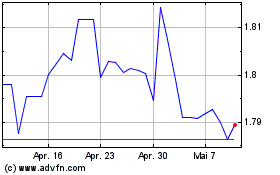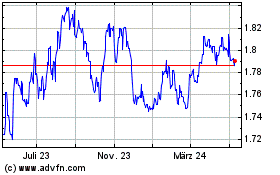Antipodean Currencies Advance As Asian Shares Traded Higher, Yen Slides
29 September 2023 - 5:20AM
RTTF2
Antipodean currencies such as the Australia and the New Zealand
dollars strengthened against their major currencies in the Asian
session on Friday, as Asian stock markets traded higher amid
China's Golden week holiday. Traders are indulging in bargain
hunting as they picked up stocks at reduced levels following recent
weakness even as concerns remain about interest rates and the
outlook for global economic growth.
In economic data, the Reserve Bank of Australia said that
Australia's monthly private sector credit rose 0.4 percent in
August, compared to the previous growth of 0.3 percent. On yearly
basis, the private sector credit rose 5.1 percent after rising 5.3
percent.
Meanwhile, the housing credit remained unchanged at 0.3 percent
in the month of August.
Data from ANZ-Roy Morgan showed that the New Zealand's consumer
confidence rose to 86.4 in September, from 85.0 in the prior
month.
The safe-haven yen weakened against other major currencies, as
Asian stock markets traded higher. Traders are also weighing the
possibility of the Japanese central bank intervening in the
currency market as the yen slides toward the 150 a dollar mark.
In economic news, the unemployment rate in Japan came in at a
seasonally adjusted 2.7 percent in August, the Ministry of Internal
Affairs and Communications or MIAC, said on Friday. That was
unchanged from the July reading, although it missed expectations
for 2.6 percent. The jobs-to-applicant ratio was 1.29, unchanged
and in line with forecasts. The participation rate also was
unchanged, at 63.1 percent.
The MIAC also said overall consumer prices in the Tokyo region
of Japan were up 2.8 percent on year in September. That was in line
with forecasts and down from 2.9 percent in August. Core CPI, which
excludes the volatiles costs of food, was up an annual 2.5 percent
- shy of expectations for 2.6 percent and down from 2.8 percent in
the previous month.
Further, the Ministry of Economy, Trade and Industry or METI,
said the value of retail sales in Japan jumped 7.0 percent on year
in August, coming in at 13.391 trillion yen. That exceeded
expectations for a gain of 6.0 percent following the upwardly
revised 7.0 percent gain in July. On a monthly basis, retail sales
rose 0.1 percent, easing from 2.2 percent in the previous
month.
The METI also said Industrial output in Japan came in flat in
August, beating expectations for a decline of 0.8 percent following
the 1.8 percent drop in July. On a yearly basis, industrial
production fell 3.8 percent after slipping 2.3 percent in the
previous month.
In the Asian trading now, the Australian dollar rose to nearly a
3-month high of 96.52 against the yen and nearly a 2-month high of
1.6374 against the euro, from yesterday's closing quotes of 95.89
and 1.6429, respectively. If the aussie extends its uptrend, it is
likely to find resistance around 98.00 against the yen and 1.61
against the euro.
Against the U.S. and the Canadian dollars, the aussie advanced
to a 1-week high of 0.6461 and a 9-day high of 0.8708 from
Thursday's closing quotes of 0.6423 and 0.8662, respectively. The
aussie may test resistance around 0.66 against the greenback and
0.89 against the loonie.
The NZ dollar rose to nearly an 8-1/2-year high of 89.73 against
the yen, from yesterday's closing value of 89.11. The kiwi may test
resistance around the 91.00 region.
Against the U.S. dollar and the euro, the kiwi advanced to a
4-week high of 0.6007 and a 2-1/2-month high of 1.7614 from
Thursday's closing quotes of 0.5969 and 1.7678, respectively. If
the kiwi extends its uptrend, it is likely to find resistance
around 0.61 against the greenback and 1.71 against the euro.
The kiwi edged up to 1.0776 against the Australian dollar, from
yesterday's closing value of 1.0753. On the upside, 1.09 is seen as
the next resistance level for the kiwi.
The yen fell to an 8-day low of 182.67 against the pound, from
yesterday's closing value of 182.09. The next support level for the
yen is seen around the 187.00 region.
Against the euro and the Swiss franc, the yen dropped to 4-day
lows of 158.11 and 163.58 from Thursday's closing quotes of 157.64
and 163.12, respectively. If the yen extends its downtrend, it is
likely to find support around 160.00 against the euro and 167.00
against the franc.
Against the U.S. and the Canadian dollars, the yen edged down to
149.51 and 110.88 from yesterday's closing quotes of 149.29 and
110.67, respectively. The yen may test support around 152.00
against the greenback and 112.00against the loonie.
Looking ahead, Eurostat is set to issue euro area flash
inflation figures for September at 5:00 am ET. Inflation is
expected to slow to 4.5 percent from 5.2 percent in the previous
month.
At 3:40 am ET, European Central Bank President Christine Lagarde
will deliver a speech at the joint IEA-ECB-EIB conference on
"Ensuring an orderly energy transition: Europe's competitiveness
and financial stability in a period of global energy
transformation" in Paris, France.
In the New York session, Canada GDP data for August and budget
balance for July, U.S. PCE price index for August, U.S. goods trade
balance for August and personal income and spending for August,
retail and wholesale inventories for August, U.S. Chicago PMI for
September, U.S. University of Michigan's consumer sentiment for
September and U.S. Baker Hughes oil rig count data are slated for
release.
Euro vs NZD (FX:EURNZD)
Forex Chart
Von Jun 2024 bis Jul 2024

Euro vs NZD (FX:EURNZD)
Forex Chart
Von Jul 2023 bis Jul 2024
